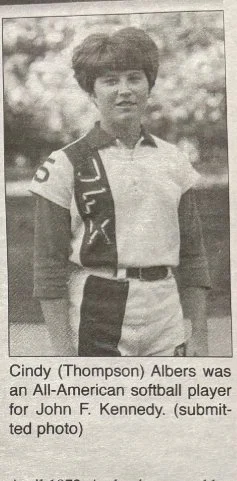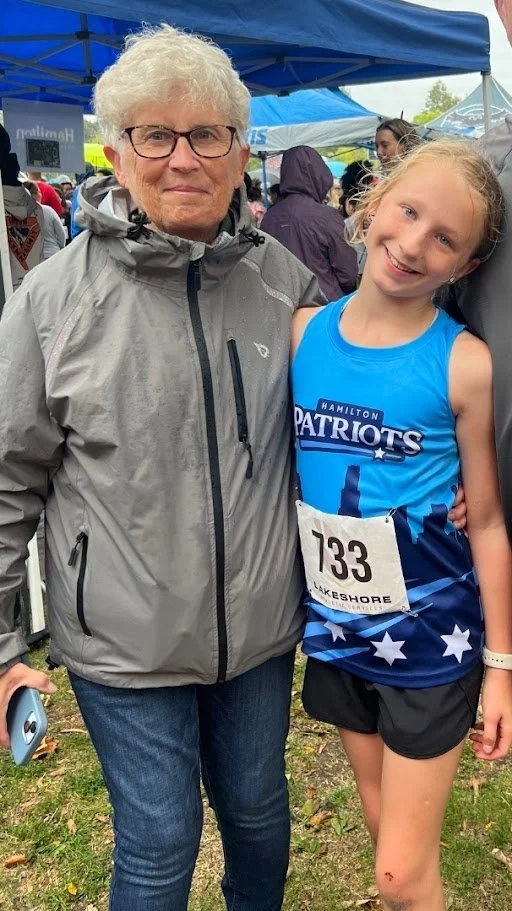Softball’s Evolution: From Humble Beginnings to National Spotlight
/With the NCAA Women’s College World Series kicking off yesterday, I wanted to share a special story that was sent to us by Brad Albers, dad of Elisabeth Albers from Hamlin Park Lions 10U team. Elisabeth’s grandmother, Cindy Albers, has an incredible softball legacy—she played in the very first Women’s College World Series in 1969!
Her hometown newspaper featured a great article in 2022 about her journey and her role as a pioneer in a tournament that’s now watched by over 1.1 million people. It’s wild to think how far the game has come—and how women like Cindy helped lay the foundation.
A few things stood out to me from the article. Her attitude was truly inspiring. She played at a time when opportunities were sparse—when many girls didn’t even have teams to join. There simply weren’t all that many ladies playing. However, she didn’t seem to notice! That mindset—focusing on what you do have, showing up, having fun, and staying positive—is what grows the game. The more people who love it, who organize leagues, who encourage their friends to join, who give lessons, who coach, the more momentum there is for lifting the sport. There will be more competition, more players, and more opportunities all around.
Cindy Albers might be visiting our classes this Sunday, and we’re so excited for the opportunity to hear her story in person. We are grateful to learn from a true trailblazer!
Tuesday, August 16, 2022
Decorah’s Albers recalls early days of Title IX
By Becky Walz
When we had played our last high school softball game and I was crying, my mom said ‘Oh, Cynthia, second isn’t that bad.’ And I told her that I wasn’t crying because we lost, I’m crying because I’ll never play softball again.”
Cindy (Thompson) Albers was wrong, and she, like many girls growing up throughout the United States, was on the forefront of the women’s sports movement.
Growing up in Van Horne, Albers spent plenty of time at her aunt’s and uncle’s, playing softball and basketball in the back yard with a board backstop. It was unlike many other girls, who routinely wore dresses and skirts to school.
“I played with the boys all through high school and never thought of not playing. I remember hearing the early disputes on Title IX and thinking why does a girl want to play baseball? She could just play softball, then I found out that many schools didn’t have sports for gals. It was just something I took for granted.”
In 1972, just after Albers graduated from Western College and transferred to Parsons College in Fairfield, Title IX was passed, stating no person in the United States shall, on the basis of sex, be excluded from participation in, be denied the benefits of, or be subjected to discrimination under any educational program or activity receiving federal financial assistance.
Back on the field
After her high school graduation, she joined the Yankees fast pitch and entered a junior college before transferring to John F. Kennedy (JFK) in Wahoo, Neb., and joined the fastpitch team there.
In the days before athletic scholarships, Albers and her teammates, the Patriettes, played 40 to 60 games a season, traveling throughout the south, including Kansas, Missouri and Texas and experienced a lot including discrimination.
“I remember going into one place to eat in the south and we had a black girl on our team, Cha Cha, and when they refused to serve her, we all got up and walked out. Looking back, at that time, we weren’t teaching. We were experiencing it before,” said Albers.
The All-American shortstop and Head Coach Don “Pappy” Koenecke’s team had a relationship with Nebraska State Softball Commissioner Bill Smith that gave push for the creation of a series known as Women’s College World Series in Omaha, Fremont, Neb.
The Patriettes would go on to be one of the first teams to win it in 1969, outscoring their opponents 39-4.
“The first World Series wasn’t very big. Anyone who had the means to travel played. Since teams have to qualify, it was surprising how many teams signed up and came,” said Albers as she looked through the title IX programs at her kitchen table.
“The very first one only had nine entries. It should have had 10, but the team from the Philippines had mechanical problems on the plane and had to turn around and go home.”
Each member of the top four teams received a trophy, and Albers was one of four Patriettes named to the all-tournament team.
JFK returned the next two years to the top of the WCWS before their dynasty came to a halt in April 1972. At the time, no athletic scholarships were given out for females; however, basketball and volleyball were offered.
Even then, Albers had moved on to play at Parsons College in Fairfield for her senior season.
Reflecting on her years playing in college, Albers said she saw no difference in how males and females were treated.
“The guys on campus and people in town always wanted to watch the women play. All lettermen got a pin and jackets and that included the women. We got the meal money and played the steaks before the games,” she noted. “I saw nothing that discriminated against us. We were so fortunate. But to know what we were before Title IX, it’s remarkable that we were able to do something so high-profile and succeed.”
Life moves on
Coming from a family who enjoyed sports, Albers continued her love of athletics as a physical education teacher following her college graduation in 1971 at the state juvenile home for two years, then Yale-Jamaica-Bagley (YJB), West of Ames. Her career at Decorah began in 1975 as a teacher, as well as a variety of coaching positions that included softball, basketball and volleyball.
Albers did step away from coaching to enjoy watching her own children — Amy, Brad and Justin — compete but has since found ways to remain involved in Viking athletics. Now that her children are grown as she helps in the football press box or the sidelines for volleyball and basketball games.
While the Decorah resident is shy about sharing her early softball experiences she noted, “The friendships, experiences and travel that I got from the sport was unbelievable. I am very, very proud to be in the first three World College Series. I am glad that I had the opportunity to do that.”
Albers displays the mini bats and Women’s College World Series trophies each member of the top four teams received in the inaugural games in 1969, 1970 and 1971. (Driftless Multimedia photo by Becky Walz)
"ABOVE: John F. Kennedy softball coach Don June (center) beams over the first world championship trophy in 1969 with his four tournament all stars (l-r) Cindy Thomson (Albers), Kay Sharr (Camp), Judy Lloyd and Cathy Buell. (submitted photo)"






